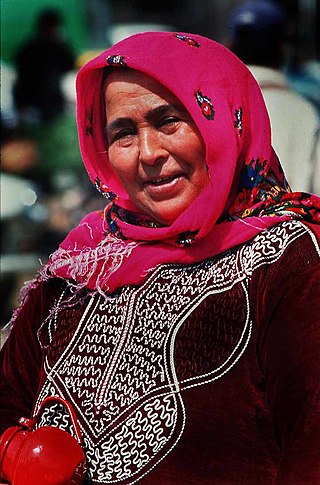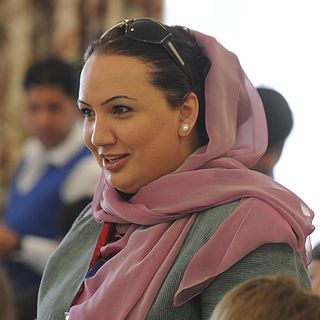Related Research Articles

In modern usage, hijab generally refers to various head coverings conventionally worn by many Muslim women. It is similar to the tichel or snood worn by Orthodox Jewish women, certain headcoverings worn by some Christian women, such as the mantilla, apostolnik and wimple, and the dupatta worn by many Hindu and Sikh women. Whilst a hijab can come in many forms, it often specifically refers to a scarf wrapped around the head, covering the hair, neck and ears but leaving the face visible. The use of the hijab has been on the rise worldwide since the 1970s and is viewed by many Muslims as expressing modesty and faith; it has also been worn for purposes of adornment. When it comes to the obligation for a Muslim woman to cover her hair and body, many have expressed confusion about the origin of this commandment. However, there has never been any debate within Sunni Islamic scholarship at any point in history regarding the obligation of hijab for all Muslim women who have reached the age of puberty.

A burqa or a burka is an enveloping outer garment worn by some Muslim women which fully covers the body and the face. Also known as a chadaree or chaadar in Afghanistan, or a paranja in Central Asia, the Arab version of the burqa is called the boshiya and is usually black. The term burqa is sometimes conflated with the niqāb even though, in more precise usage, the niqab is a face veil that leaves the eyes uncovered, while a burqa covers the entire body from the top of the head to the ground, with a mesh screen which only allows the wearer to see in front of her.

Quran desecration is the treatment of the Quran in a way that might be considered insulting.
Islamic feminism is a form of feminism concerned with the role of women in Islam. It aims for the full equality of all Muslims, regardless of gender, in public and private life. Islamic feminists advocate for women's rights, gender equality, and social justice grounded in an Islamic framework. Although rooted in Islam, the movement's pioneers have also utilized secular, Western, or otherwise non-Muslim feminist discourses, and have recognized the role of Islamic feminism as part of an integrated global feminist movement.

Malalai Joya is an activist, writer, and a politician from Afghanistan. She served as a Parliamentarian in the National Assembly of Afghanistan from 2005 until early 2007, after being dismissed for publicly denouncing the presence of warlords and war criminals in the Afghan Parliament. She was an outspoken critic of the Karzai administration and its western supporters, particularly the United States.
During the late 20th and early 21st centuries in Iran, women's rights have been severely restricted, compared with those in most developed nations. The World Economic Forum's 2017 Global Gender Gap Report ranked Iran 140, out of 144 countries, for gender parity. In 2017, in Iran, females comprised just 19% of the paid workforce, with seven percent growth since 1990. In 2017, the Georgetown Institute for Women, Peace and Security (WPS) Index ranked Iran in the bottom tercile of 153 countries. Compared to other South Asian regions, women in Iran have a better access to financial accounts, education, and cellphones. Iran was ranked 116, out of the 153 countries, in terms of legal discrimination against women.
The timeline of women's legal rights (other than voting) represents formal changes and reforms regarding women's rights. The changes include actual law reforms, as well as other formal changes (e.g. reforms through new interpretations of laws by precedents). The right to vote is exempted from the timeline: for that right, see Timeline of women's suffrage. The timeline excludes ideological changes and events within feminism and antifeminism; for that, see Timeline of feminism.
Movements for Muslim women to seek roles in national leadership have increased rapidly. Greater opportunities for women in education have further encouraged their involvement in politics. The most prominent and important Muslim female leaders are former prime minister of Pakistan Benazir Bhutto, Indonesian President Megawati Sukarnoputri (2001–2004), former Turkish Prime Minister Tansu Çiller (1993–1996), former Senegalese Prime Minister Mame Madior Boye (2001–2002), Bangladeshi Prime Ministers Khaleda Zia and Sheikh Hasina Wajed, former Iranian Vice President Masoumeh Ebtekar (1997–2005), former Malian Prime Minister Cissé Mariam Kaïdama Sidibé (2011–2012), Kosovan President Atifete Jahjaga (2011–2016), former President of Mauritius Ameenah Gurib (2015–2018), former President of Singapore Halimah Yacob (2017–2023) and current President of Tanzania Samia Suluhu Hassan

Women's rights in Afghanistan have varied greatly depending on the time period as well as the regime in power. After King Amanullah Khan's attempts to modernize the country in the 1920s, women officially gained equality under the 1964 Constitution. However, these rights were taken away in the 1990s through different temporary rulers such as the mujahideen and the Taliban during the Afghan civil war. During the first Taliban regime (1996–2001), women had very little to no freedom, specifically in terms of civil liberties. When the Taliban was overthrown by the United States following the September 11 attacks, women's rights gradually improved under the presidential Islamic Republic of Afghanistan. Women were de jure equal to men under the 2004 Constitution.

Shukria Barakzai is an Afghan politician, journalist and Muslim feminist. She was the ambassador of Afghanistan to Norway. She is a recipient of the International Editor of the Year Award.

Various styles of head coverings, most notably the khimar, hijab, chador, niqab, paranja, yashmak, tudong, shayla, safseri, carşaf, haik, dupatta, boshiya and burqa, are worn by Muslim women around the world, where the practice varies from mandatory to optional or restricted in different majority Muslim and non-Muslim countries.
The Shia Personal Status Law, also known as the Shia Family Law, is a law of Afghanistan that was approved in February 2009 with Afghan President Hamid Karzai's signature. The law, which was written in collaboration with Shiite religious leaders, codified customs relating to marriage, family, and inheritance. The law only affects the Shia denomination of Afghanistan, encompassing approximately six million people. Family issues had previously been decided by customary law.

The Karzai administration was the government of Afghanistan under President Hamid Karzai, who became the head of state of Afghanistan in December 2001 after the Taliban government was overthrown. Karzai was appointed at the 2002 Loya Jirga as the Interim President of the Afghan Transitional Administration. After the 2004 Afghan presidential election, he became the President of Afghanistan.

An acid attack, also called acid throwing, vitriol attack, or vitriolage, is a form of violent assault involving the act of throwing acid or a similarly corrosive substance onto the body of another "with the intention to disfigure, maim, torture, or kill". Perpetrators of these attacks throw corrosive liquids at their victims, usually at their faces, burning them, and damaging skin tissue, often exposing and sometimes dissolving the bones. Acid attacks can lead to permanent, partial, or complete blindness.

The Hazaras have long been the subjects of persecution in Afghanistan. The Hazaras are mostly from Afghanistan, primarily from the central regions of Afghanistan, known as Hazarajat. Significant communities of Hazara people also live in Quetta, Pakistan and in Mashad, Iran, as part of the Hazara and Afghan diasporas.
Human rights in the Maldives, an archipelagic nation of 417,000 people off the coast of the Indian Subcontinent, is a contentious issue. In its 2011 Freedom in the World report, Freedom House declared the Maldives "Partly Free", claiming a reform process which had made headway in 2009 and 2010 had stalled. The United States Bureau of Democracy, Human Rights and Labor claims in their 2012 report on human rights practices in the country that the most significant problems are corruption, lack of religious freedom, and abuse and unequal treatment of women.
Rape is a major issue in Afghanistan. A number of human rights organizations have criticized the country's rape laws and their enforcement.

Farkhunda Malikzada, commonly referred to as Farkhunda, was a 27-year-old woman who was publicly lynched by a mob in Kabul, the capital of Afghanistan, on 19 March 2015. A large crowd formed in the streets around her claiming that she had burned the Quran, and for that, her accusers announced that she must be sent to Hell right away.
Humira Saqib is an Afghan journalist and women's human rights activist. Through her writings in the magazine Negah-e-Zan and in Afghan Women's News Agency, she has been protesting against extreme forms of harassment against women in her radically Islamic country. She has pleaded for parliament to enact laws for the elimination of violence against women. Saqib pursues her efforts to further women's rights by working for the women's news agency as a writer and editor.
Alina Lebedeva is a Latvian Russian politician and activist known for slapping then-Charles, Prince of Wales with three red flowers in 2001 at age 16. In other actions, she allegedly set fire to a door of the Latvian Ministry of Education and was arrested for a political protest in Moscow.
References
- ↑ Bobin, Frédéric (12 September 2009). "Sabrina Saqeb, députée à la pointe du combat des femmes en Afghanistan". Le Monde. Retrieved 14 November 2016.
- 1 2 3 Najafizada, Shoib; Gebauer, Matthias (3 March 2009). "Legalized Oppression of Women: Western Outrage over Discriminatory Afghan Law". Spiegel. Retrieved 14 November 2016.
- 1 2 Loshkin, Anna (25 May 2014). "Afghanistan's Women Emerge". The Diplomat. Retrieved 14 November 2016.
- 1 2 "Women protesting at 'pro-rape' law attacked by Afghan men". The Independent. 16 April 2009. Retrieved 14 November 2016.